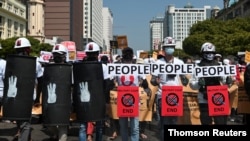The United Nations is warning of “the potential for violence on a greater scale” in Myanmar as protesters stage their biggest demonstration to date against the military’s overthrow of the civilian government.
Thousands of demonstrators gathered Wednesday in the streets of Yangon, Myanmar’s largest city, despite a ban on gatherings of more than four people imposed by the military. Roads and bridges leading into and through Yangon were blocked by cars with their hoods up, making them appear to have engine trouble, a new tactic employed by protesters to keep out police and military vehicles.
Protesters have filled the streets of Myanmar’s biggest cities every day since de facto leader Aung San Suu Kyi and other high-ranking government officials were detained in the February 1 coup. The protesters have displayed placards with pro-democracy slogans, many of them with pictures of Suu Kyi, and adopted a three-fingered salute as a sign of resistance against tyranny depicted in the popular “Hunger Games” films.
Scores of private and public sector employees and civil servants have joined in the mass demonstrations against the coup by walking off their jobs. The military has ordered civil servants back to work and threatened action against them.
Security forces have grown increasingly aggressive against the protesters, firing warning shots, rubber bullets and water cannons in an effort to disperse the crowds. The country’s Assistance Association for Political Prisoners group said more than 450 arrests had been made since the coup, many of them in night-time raids.
Tom Andrews, the U.N. Special Rapporteur on the situation of human rights in Myanmar, said Tuesday in a written statement that such troop movements during the previous junta “preceded killings, disappearances, and detentions on a mass scale.’
“I am terrified that given the confluence of these two developments - planned mass protests and troops converging - we could be on the precipice of the military committing even greater crimes against the people of Myanmar,” Andrews said.
The regime briefly shutdown Internet services Tuesday for a third consecutive night.
The military has cited widespread fraud in last November’s general elections, won by Suu Kyi’s National League for Democracy in a landslide, as justification for the takeover. Those claims were rejected by Myanmar’s electoral commission. The junta has declared a one-year state of emergency and has promised to hold a new round of elections.
Suu Kyi has been under house arrest at her official residence in Naypyitaw since the coup. Authorities filed a second charge Tuesday against Suu Kyi in an apparent legal maneuver that could keep her detained indefinitely.
Suu Kyi’s lawyer told reporters in Naypyitaw after meeting with a judge that she was charged with violating the country’s COVID-19 containment restrictions. She was
previously charged with illegally possessing imported walkie-talkie radios without a license. Violating the law is punishable by a maximum of three years in prison.
President U Win Myint is also under house arrest.
Western nations have strongly condemned the coup in Myanmar, and even China has begun to express concern about the situation. Chen Hai, Beijing’s ambassador to Naypyitaw, said Tuesday that current state of affairs is “absolutely not what China wants to see.”




